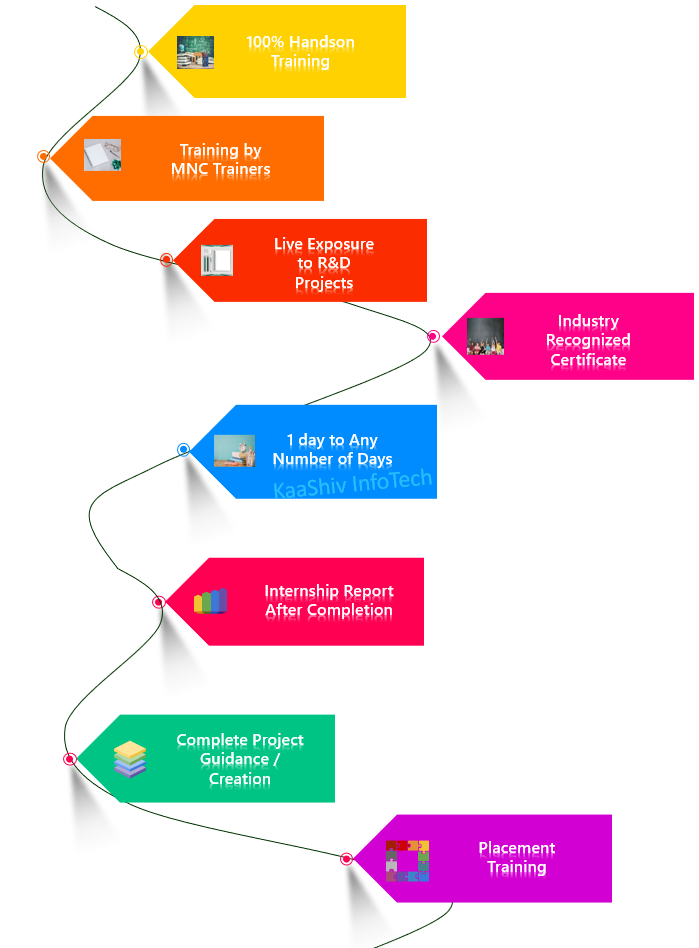India’s No:1
sql internship in chennai
- SQL Server Basics – SQL Programming, DBMS Introduction
- Constraints in SQL Server – Types of Constraints & Their Implementation
- Functions in SQL Server – Different Types of Functions, String Functions, Date/Time Functions
- Joins in SQL Server – Types of Joins & Their Implementation
- SQL Server Programming – SQL Server Programming & Its Implementation
- SQL Server Project – Step-by-Step Procedure in Implementing SQL Server Programming
WHAT WE GIVE?
Certificates and Documents we offer for this Training
- Internship Certificate.
- Project Completion Certificate.
- Inplant Training(IPT) Certificate.
- Free Workshop Certificate.
- Free Corporate Training Test certificate.
- Training Documents.
- Sample Resume for Placement.
- Useful Softwares.
- Internship Report.
- Our AI Training Portal Access.
Why Internship is Important?
SQL INTERNSHIP IN CHENNAI

Learn by Doing
Put your skills to work on real projects, not just practice problems.

Find Your Passion
Try different areas of SQL Internship in Chennai to see what clicks

Level Up Your Skills
Gain practical experience that will impress future employers

Boost Your Resume
Show employers you're serious and have what it takes
BEST COMPANY OFFERING SQL INTERNSHIP
Why to choose KaaShiv Infotech for sql internship in chennai
The course curriculum for the SQL Internship is carefully crafted by industry experts from top MNCs to meet the evolving needs of the IT industry. Upon completing the SQL Internship at KaaShiv Infotech in Chennai, students will acquire in-depth knowledge of SQL programming, database management, and its real-world applications. Below are some key highlights of our program, which includes a valuable internship opportunity focused on SQL Database Management.


sql internship in chennai
Short Term Internship (sql internship in chennai )
Learn and Implement
45 Concepts Covering 7 Technologies
+ 2 Projects
Short Term - sql Internship in chennai
- SQL Internship – Duration: 1 day, 2 days, 3 days, 5 days / 10 days or Based on Student Preference
- Training hours: 3 hrs per day
- Software & other tools installation guidance
- Hardware support
- SQL Internship Report creation / SQL Internship Project Report creation
- KaaShiv Infotech is a leading provider of SQL internship in Chennai, 1 Real-time project – After 6 months of regular Paid Internship, Internship becomes free + Stipend provided for best interns + Best performers will be offered job opportunities.
- Internship Certificate & Inplant Training Certificate & Industrial Exposure Certificate + (Achievement certificate for best performers)


S.No |
SQL Developer Internship – Syllabus100% Practical – Live Hands-On – Advanced Oracle/SQL Server Internship |
|---|---|
| Topic 1 : | DBMS Introduction – What is DBMS and its usage? Introduction to relational databases, difference between relational and non-relational databases, different types of DBMS available in the market, different versions of MS SQL Server, why SQL is used in DBMS, introduction to SQL scripts. |
| Topic 2 : | What is SQL Server – Important icons and options in SSMS, features of SSMS, types of SQL commands – DDL, DML, DCL, TCL, integer, string, and datetime data types, user-defined data types, operators (arithmetic, logical, comparison), variable definitions (local, global), and types of variables. |
| Topic 3 : | Constraints in SQL Server – Types of SQL constraints – Primary key, foreign key, unique key, not null, default constraint, check constraint, identity column, inserting values in identity column, reseeding identity column values, and retrieving the last generated identity value. |
| Topic 4 : | Functions in SQL Server – System functions in SQL Server, types of system functions (aggregate, mathematical, string, datetime), common table expressions (CTE), usage of CTE for deleting duplicate records, types of functions (scalar functions, inline and multi-statement table-valued functions), deterministic and non-deterministic functions. |
| Topic 5 : | SQL Server Advanced – What is a sequence in SQL Server, creating and reseeding sequences, getting the last generated sequence value, differences between identity and sequence, using ORDER BY, GROUP BY, TOP, DISTINCT, HAVING clauses, schema creation and deletion. |
+ Internship Certificate
+ Inplant Training Certificate
+ Free Industrial Exposure Certificate + (Achievement Certificate for Best Performers) + 1 SQL Project
Learn and Implement
70 to 400 Concepts Covering 9 Technologies
+ 3 to 4 Projects
Long Term -sql internship
-
- SQL Developer Internship in Chennai – Duration: 6 days to 6 Months or Based on Student Preference
- Training hours: 3 hrs per day
- Software & other tools installation Guidance
- Hardware support
- SQL Developer Internship Report creation / SQL Developer Project Report creation
- KaaShiv Infotech is a leading provider of SQL Developer Internships, based on real-time SQL projects.
- 3 Certificates will be given
- Internship Certificate
- Inplant Training Certificate
- Industrial Exposure Certificate
- + (Experience Letter for best performers and Researchers)
- Free SQL Developer Internship – After 6 months of regular Paid Internship, Internship becomes free. + For best interns, a stipend will be provided. + Best Interns will be offered job opportunities.


S.No |
SQL Developer Internship – Syllabus100% Practical – Live Hands-On – Advanced Oracle/SQL Server Internship |
|---|---|
| Topic 1 : | DBMS Introduction – What is DBMS and its usage? Introduction to relational databases, difference between relational and non-relational databases, different types of DBMS available in the market, different versions of MS SQL Server, why SQL is used in DBMS, introduction to SQL scripts. |
| Topic 2 : | What is SQL Server – Important icons and options in SSMS, features of SSMS, types of SQL commands – DDL, DML, DCL, TCL, integer, string, and datetime data types, user-defined data types, operators (arithmetic, logical, comparison), variable definitions (local, global), and types of variables. |
| Topic 3 : | Constraints in SQL Server – Types of SQL constraints – Primary key, foreign key, unique key, not null, default constraint, check constraint, identity column, inserting values in identity column, reseeding identity column values, and retrieving the last generated identity value. |
| Topic 4 : | Functions in SQL Server – System functions in SQL Server, types of system functions (aggregate, mathematical, string, datetime), common table expressions (CTE), usage of CTE for deleting duplicate records, types of functions (scalar functions, inline and multi-statement table-valued functions), deterministic and non-deterministic functions. |
| Topic 5 : | SQL Server Advanced – What is a sequence in SQL Server, creating and reseeding sequences, getting the last generated sequence value, differences between identity and sequence, using ORDER BY, GROUP BY, TOP, DISTINCT, HAVING clauses, schema creation and deletion. |
+ Internship Certificate
+ Inplant Training Certificate
+ Free Industrial Exposure Certificate + (Achievement Certificate for Best Performers) + 1 SQL Project
Apply for sql internship in chennai
Contact Number / Whatsapp Number
- Mobile 1 : +91 7667662428
- Mobile 2 : +91 7667664842
- Mobile 3 : +91 9840678906
Email ID
5 DAYS – SQL Developer Internship in Chennai
DAY 1 : SQL Developer Internship in Chennai
- Introduction to DBMS
- What is SQL? Overview of SQL Commands
- SQL Data Types: Integer, String, DateTime
DAY 2 : SQL Developer Internship in Chennai
- SQL Server Setup and Introduction to SSMS
- Understanding SQL Server Architecture
- Types of SQL Commands: DDL, DML, DCL, TCL
DAY 3 : SQL Developer Internship in Chennai
- Introduction to SQL Joins: Inner Join, Left Join, Right Join, Full Join
- Working with Aggregate Functions: COUNT, SUM, AVG, MIN, MAX
- Filtering Data with WHERE and HAVING Clauses
DAY 4 : SQL Developer Internship in Chennai
- Introduction to SQL Constraints: Primary Key, Foreign Key, Unique, Check, Not Null
- Working with Subqueries and Nested Queries
- Using Functions in SQL: String Functions, DateTime Functions, Aggregate Functions
DAY 5 : SQL Developer Internship in Chennai
- Introduction to Stored Procedures and Triggers
- Working with Views and Indexes
- Introduction to SQL Server Transactions and Locking Mechanisms
- Final Project: Build and Optimize a SQL Server Database
What does a SQL Developer intern do?
Hands-On SQL Database Development and Management
- Interns at KaaShiv Infotech are actively involved in working with SQL databases, writing complex queries, and managing data using SQL Server or Oracle SQL. They gain hands-on experience with data retrieval, data manipulation (CRUD operations), and performance optimization techniques such as indexing and query optimization. Interns work on real-world databases, learning to create, modify, and maintain tables, views, stored procedures, and triggers. This provides them with practical knowledge of database management and prepares them for future roles as SQL developers.
Collaboration on SQL Projects
- Interns collaborate with senior developers and database administrators on various SQL-related projects. They contribute to tasks such as data migration, designing database schemas, and troubleshooting SQL queries. Interns may be involved in team meetings, where they discuss project requirements, database architecture, and performance improvements. This collaborative environment provides valuable exposure to team-based development workflows and allows interns to gain experience in handling live database systems, ensuring they understand the practical aspects of working with large-scale databases.
Learning Best Practices in SQL and Database Management
- Interns at KaaShiv Infotech are trained in SQL best practices, such as writing optimized queries, working with transactions, and maintaining data integrity. They learn about data normalization, indexing strategies, and the importance of security measures like data encryption and access control. Interns also get exposure to version control tools like Git to manage database-related code. They assist in ensuring that databases are well-structured, reliable, and scalable. This exposure to best practices in database management is key to becoming proficient in SQL development and understanding the real-world challenges of maintaining high-performance databases.
How to Get a SQL Internship ?
Build Relevant SQL and Database Skills
- To secure a SQL Internship at KaaShiv Infotech, start by mastering core SQL concepts such as data types, operators, and SQL commands like SELECT, INSERT, UPDATE, and DELETE. Learn about database design, normalization, and relationships between tables, including primary keys, foreign keys, and indexing. Gain experience in working with relational databases like MySQL, SQL Server, or PostgreSQL. Familiarize yourself with advanced SQL topics such as stored procedures, triggers, views, and joins. Additionally, understanding database optimization techniques such as query optimization, indexing, and performance tuning will set you apart. Build practical skills by working on database-driven projects, creating databases, and writing complex queries to solve real-world problems. This hands-on experience will help you demonstrate your SQL expertise and improve your chances of landing a SQL Internship at KaaShiv Infotech.
Create a Strong Resume
- Crafting a strong resume is essential for securing a SQL Internship at KaaShiv Infotech. Start by highlighting your academic background, particularly courses in database management, SQL, or data structures. If you have completed any certifications or specialized courses in SQL or database technologies, make sure to include them. Showcase your hands-on experience by listing database projects where you’ve designed schemas, wrote queries, or optimized performance. Include relevant skills such as proficiency in SQL, knowledge of database management systems (DBMS) like SQL Server, MySQL, or Oracle, and familiarity with tools like SQL Server Management Studio (SSMS) or MySQL Workbench. If you have experience with any additional technologies such as Python for database automation or familiarity with NoSQL databases like MongoDB, be sure to mention that as well. A well-organized resume that highlights your SQL knowledge and practical experience will make you an attractive candidate for a SQL Internship at KaaShiv Infotech.
Are SQL Internships Remote?
Availability of Remote SQL Internships
- SQL internships, including those at KaaShiv Infotech, are increasingly available in remote formats. With the rise of remote work, many organizations are now offering the flexibility for interns to work from anywhere, provided they have a stable internet connection. This allows students and aspiring SQL professionals to gain valuable hands-on experience in database management, query optimization, and SQL programming without being limited by geographical location. While remote opportunities can vary depending on the role and specific project requirements, it’s important for prospective interns to check internship listings and directly inquire with the company about remote work availability and expectations.
Benefits of Remote SQL Internships:
- Remote SQL internships, especially those at KaaShiv Infotech, offer several advantages. Interns can work from anywhere, reducing commuting time and costs, while still gaining real-world experience in SQL programming, database design, and query optimization. The flexibility of remote work enables interns to balance academic commitments or other personal obligations while acquiring industry-relevant skills. Additionally, working remotely in an SQL internship gives interns the opportunity to collaborate with global teams, enhancing exposure to different database technologies and methodologies. Interns will also develop strong communication, time management, and self-discipline skills, as they rely on virtual collaboration tools like Slack, Zoom, and version control systems like Git to manage their tasks. Furthermore, remote SQL internships help interns adapt to the growing trend of remote work in the tech industry, which can open doors to a wide range of career opportunities in the future.
Are Virtual Internships Useful in SQL?
Flexibility and Accessibility
- Virtual internships in SQL provide significant flexibility, allowing interns to work from anywhere with a reliable internet connection. This makes SQL internships accessible to a broader pool of candidates, including those who may face challenges like geographical constraints, travel costs, or time limitations. Interns can create their own schedules and work environments, making it easier to balance studies, part-time jobs, or other commitments. The flexibility of virtual SQL internships enables interns to focus on mastering database management, writing complex queries, and optimizing SQL performance—all without needing to be physically present in an office environment.
Skill Development
- Virtual SQL internships offer interns the opportunity to develop both technical and soft skills. Interns gain hands-on experience with SQL Server, MySQL, and other relational database management systems (RDBMS), enhancing their ability to write complex queries, perform data analysis, and manage large datasets. Additionally, they become proficient in data modeling, database normalization, and performance optimization techniques. Many virtual SQL internships also provide exposure to database administration tools, cloud platforms, and version control systems like Git. Furthermore, working remotely helps interns refine important skills like self-discipline, time management, and communication, which are highly valued in the tech industry. This experience not only prepares interns for full-time roles in SQL development but also opens the door to opportunities in data analytics, database administration, and other related fields.
What Are the Skills Required for SQL Development?
SQL Programming Proficiency
- A deep understanding of SQL is essential for anyone pursuing a career in database management or SQL development. Interns should be proficient in writing SQL queries to retrieve, update, delete, and manipulate data from relational databases. Knowledge of SQL syntax, commands (such as SELECT, INSERT, UPDATE, DELETE), and operators is fundamental. Advanced SQL skills include understanding JOINs, subqueries, window functions, and complex queries for data analysis and reporting. Familiarity with different database systems like SQL Server, MySQL, PostgreSQL, or Oracle is also crucial, as each platform has its own nuances and features.
Database Management and Design Skills
- SQL developers must possess strong database design and management skills. This includes understanding how to create, modify, and manage relational databases. Interns should know how to design normalized database schemas to ensure data integrity and avoid redundancy. Skills in defining relationships between tables (one-to-many, many-to-many) using primary and foreign keys, creating indexes, and optimizing database performance are key to handling large datasets. Understanding of database normalization and denormalization techniques, as well as how to enforce constraints like NOT NULL, UNIQUE, and CHECK, is essential for maintaining data accuracy.
SQL Query Optimization and Performance Tuning
- Optimizing SQL queries for performance is a critical skill for SQL developers. Interns should be able to identify inefficient queries and know how to improve them. This includes understanding how to create and use indexes to speed up searches, how to write more efficient joins, and how to use EXPLAIN plans to analyze query performance. Interns should also be familiar with techniques like query caching and indexing to optimize database operations. Additionally, they should understand the impact of database design choices on performance and scalability.
Data Security and Backup Strategies
- As an SQL developer, data security is paramount. Interns should understand how to implement data access controls to protect sensitive information, using roles and permissions to grant access to specific users. SQL developers should also be familiar with backup and recovery strategies to prevent data loss. Knowledge of data encryption techniques, both at rest and in transit, is essential for ensuring data privacy. Interns may also be introduced to disaster recovery plans and how to restore databases from backups after a failure.
Working with Stored Procedures and Triggers
- A key part of SQL development involves creating and working with stored procedures, functions, and triggers. Interns should learn how to create reusable SQL code using stored procedures and functions for complex operations. Understanding triggers—automatic actions that happen when certain events occur (like data inserts, updates, or deletes)—is essential for automating tasks within a database. These advanced SQL features help developers write cleaner, more efficient code and enforce business logic directly in the database layer.
FAQ'S
sql internship FAQs: Frequently Asked Questions
Frequently Asked Questions: SQL Internship at Kaashiv Infotech
Are SQL Jobs in Demand?
- Yes, SQL development jobs are in high demand! As businesses continue to rely heavily on data for decision-making, the need for skilled database professionals is greater than ever. Roles such as SQL Developer, Database Administrator, Data Analyst, and Database Engineer are highly sought after across industries like finance, healthcare, e-commerce, and technology. The growth of big data, cloud computing, and the increasing reliance on structured data means that SQL expertise is crucial for companies looking to manage, analyze, and secure their data efficiently.
How Should I Start Learning SQL?
- Starting with SQL is a great decision, especially if you’re looking to break into the field of data management and analysis.
- Begin by learning the basics of SQL, including data types, operators, and basic commands such as SELECT, INSERT, UPDATE, and DELETE.Once you’re comfortable with these, dive deeper into more advanced SQL topics such as joins, subqueries, aggregate functions, and window functions.
- You can also learn about database normalization, indexes, and transaction control. Familiarize yourself with relational database management systems (RDBMS) like MySQL, PostgreSQL, SQL Server, or Oracle.
- Additionally, learning about database security, backup strategies, and SQL query optimization will enhance your skills and prepare you for real-world database challenges.
Can I Get an Online Internship in SQL?
- Yes, online SQL internships are available! The SQL internship at Kaashiv Infotech offers hands-on experience in managing databases, writing efficient SQL queries, and optimizing database performance. Interns will work with real-world databases, learn how to create and manage tables, write complex SQL queries, and handle data security and backup strategies. These online internships provide flexibility while offering valuable exposure to industry-standard tools and technologies used in database management. This is a great opportunity for anyone looking to gain practical experience and build a career in data management or database development.
What Certification Will I Get After the SQL Internship?
- Upon completing the SQL internship at Kaashiv Infotech, each intern will receive an Industry-Recognized, ISO-Certified, and Microsoft-Sealed SQL Internship certificate. This certificate will validate your proficiency in SQL and database management, making you a strong candidate for future roles in database development, data analysis, and related fields. Having this certificate will enhance your credibility and demonstrate your expertise to future employers.
Who Can Apply for This SQL Internship?
- Students from 1st to 4th year in backgrounds such as Computer Science Engineering, Information Technology Engineering, Electronics Engineering, and related disciplines are eligible to apply for the SQL internship at Kaashiv Infotech. This internship is also open to students from non-technical backgrounds who are passionate about learning SQL and database management. If you have a keen interest in working with data and solving complex database challenges, this internship will help you develop the skills needed to succeed in the field.

